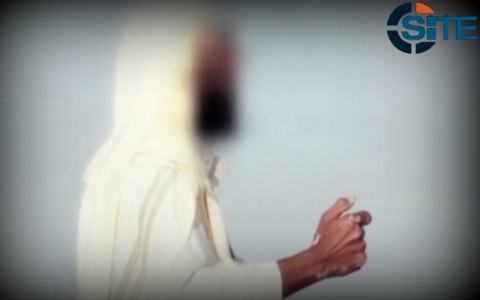BRIEFING: The Russian airline disaster, and Islamic State in Egypt
by - 25th November 2015
 WHO downed Russian airline flight 9286 as it left tourist resort Sharm el-Sheikh in October, killing all 224 on board?
WHO downed Russian airline flight 9286 as it left tourist resort Sharm el-Sheikh in October, killing all 224 on board?
Russian officials have confirmed a bomb brought down the plane, while Whitehall has labelled shadowy leader of the new ISIS affiliate Wilayat Sinai - Abu Osama al-Masry - ‘a person of interest’ in on-going investigations. Egypt has yet to release details from their investigation.
‘Foreign tourists, workers, and troops in Egypt are at greater risk than ever', wrote Zack Gold in Egypt Source.
‘Whether [WS] was responsible or made an opportunistic claim, the group’s willingness to even rhetorically target foreign interests in Egypt is another dangerous marker in a pattern of threats’, he added.
A former Azhar student and clothing importer Abu Osama al-Masry claimed responsibility on behalf ofWilayat Sinai. ‘They were shocked by a people who sought the hereafter, loved death, and had a thirst for blood’, he said.
‘We will inherit your soil, homes, wealth, and capture your women! This is Allah’s promise’.
Jurisprudence

Al-Masry, a nom-de-guerre indicating he is Egyptian, is said to have been born in northern Sinai but grew up in Sharqiya in the eastern Nile Delta.
The 42-year-old former student at the Muslim world’s most prestigious seat of learning, al-Azhar in Cairo, al-Masry is said to be 'well versed in Islamic jurisprudence' and 'eloquent in quoting the Quran'.
Wilayat Sinai, meaning ‘the province of Sinai’, pledged allegiance to the Islamic State on10 November, 2014.
It was previously known as Ansar Beit al-Maqdis (ABM), translated roughly as ‘Supporters of Jerusalem’ – implying the same apocalyptic zeal as IS.
Lapido Media nailed this affiliation a year ago – and the fact of the reluctance of the West to believe it amid the complexity of Egyptian culture and the prevalence of ‘conspiracy theories’.
On 5 November 2014, we wrote: ‘Ali expects the "Supporters of Jerusalem" – a home-grown terrorist outfit operating out of Sinai – to soon announce their allegiance to ISIS. Abu Hamza al-Muhajir, he said, was an associate of Abu Musad al-Zarqawi in the Islamic State of Iraq and believed to be killed by US forces in 2010.
‘But some evidence suggests he is still alive and operating out of the Sinai with the Supporters of Jerusalem,’ Ali said.
Shifting
If the Russian airline attack is confirmed, it will not have been the first time Wilayat Sinai has targeted foreigners.
Strategy, however, is shifting from attacking tourism in Egypt as part of an economic war, to attacking tourists in retaliation for their nation’s policies.
In February 2014 the group killed two South Koreans and an Egyptian driver in a bus traveling from St Catherine’s Monastery in the Sinai.
They also claimed responsibility for the hideous executions of American oil worker William Henderson in August 2014, and the Croatian Tomislav Salopek in August 2015.
Wilayat Sinai’s fighting force is estimated between a low of one to two thousand militants, and as high as five to twelve thousand.
The sparse population of North Sinai is approximately 435,000, or forty per square mile.
Unlike the Islamic State, WS’s composition is mostly local, consisting of veteran jihadists, disaffected Bedouin, and disillusioned youth. Some foreign fighters come from Palestine, Saudi Arabia, and Syria, and WS have issued a call for more.
Egypt has accused Turkey of providing support for Wilayat Sinai, posting names and pictures of alleged operatives they have captured.
Wilayat Sinai also benefits from members who previously served in the Egyptian military, before defecting or being expelled.
Walid Badr, a former major in the army, was the suicide bomber in the September 2013 assassination attempt on the interior minister. One month later former officers Emad Abdel Halim and Hisham Ashmawi led an assault on a checkpoint in Sinai killing 31 people.
History
WS, under its original guise of Ansar Beit al-Maqdis was formed sometime in 2011 in response to the Egyptian revolution of 25 January.
Egyptian security says ABM breathed new life into existing bands of militants such as al-Tawhid wa al-Jihad, which had conducted operations against tourism hotels in Sinai in 2004, 2005, and 2006.
After formally merging, ABM originally targeted Israel, launching a few cross-border attacks and several acts of sabotage against the Egypt-Israeli gas pipeline.
President Mohamed Morsi authorised military action against ABM after it killed 16 border guards in August 2012. But he is also understood to have preferred negotiation and tried to limit their influence through dialogue with other Sinai parties.
After Morsi’s removal from office on 3 July, 2013, ABM shifted focus and deliberately targeted Egyptian security forces.
Abu Osama al-Masry deemed Morsi an apostate and equated democracy with atheism – a typical militant Islamist trope.
But ABM sought to take advantage of the military-versus-Muslim Brotherhood conflict to paint itself as the defender of Muslims.
Al-Qa’eda
A leaked Egyptian security document from February 2015 accused the Muslim Brotherhood of working with Al-Qa’eda to send three thousand fighters to the Sinai.
Morsi, like the transitional military council before him, released jihadis from prison.
But an Egyptian researcher says that while he permitted militants a degree of operation, he did not nurture them as a ‘last resort’ to protect his office.
In addition to the acts of terrorism listed above, ABM has been a leading force in a long list of attacks in Sinai and the Egyptian mainland.
The small Christian population of roughly 650 families in the Sinai have also suffered at their hands. Many have relocated, though local Muslims have promised to protect them.
Imitating

Targeting Christians is only one of the ways Wilayat Sinai is imitating the Islamic State.
Mixing terror and piety, they have beheaded opponents and moved against drug trafficking. They have appealed to the sympathy of Bedouin tribes and distributed money to those whose homes have been destroyed in the conflict.
But Wilayat Sinai has so far failed to reproduce the primary marker of the Islamic State – territorial acquisition. They hide out in the desert, mix with the people, plant roadside bombs, and adopt guerilla tactics, but have failed to claim and hold land.
It has not been for want of trying.
Wilayat Sinai has led over four hundred attacks on security forces between 2012 and 2015, killing an estimated seven hundred soldiers.
On 1 July, 2015 militants led a full-day assault on the city of Sheikh Zuweid, following multiple coordinated attacks on surrounding checkpoints. The effort failed when the military employed F-16s in the city’s defence.
Reporting on Sinai is difficult as the government has criminalised publication of information that contradicts official statements.
Three weeks ago on 22 October, an army spokesman declared ‘full control’ over the Sinai, but terror attacks continue.
An anonymous officer said failings stemmed from unfamiliar terrain and a scorched-earth policy that alienated the population. There are also conflicting reports as to whether local tribes are joining the fight or just watching idly by.
But an anonymous militant admitted the military have severely restricted their operations, and the closing of tunnels on the Gaza border has dried up the weapon supply.
Europe
Human Rights Watch has criticised the government over the creation of a buffer zone meant to destroy the network of tunnels long exploited by traffickers and terrorists alike. Between July 2013 and August 2015 HRW reported the destruction of at least 3,255 homes and properties.
Israel claims that Hamas is aiding Wilayat Sinai, though leaders deny any connection to this ‘black extremism’.
But on Egypt’s Western border the Islamic State has been more successful in setting up a franchise. They call Libya ‘the strategic gateway’, noting its proximity to Egypt, Tunisia, African nations of the Sahel, and Europe.
In spring 2014 Libyans in Syria returned to Derna near Benghazi and pledged allegiance to the Islamic State. Fledgling states have been created for each of Libya’s three traditional regions: Cyrenaica, Tripoli, and the Fezzan.
This has sparked terrorist activity in Egypt’s Western Desert as well. In July 2014 ABM claimed responsibility for an attack in Farafra that killed 22 soldiers. Last month in pursuit of terrorist targets, the military accidentally killed eight Mexican tourists in the Bahariya oasis.
Splits
The terrorism network in Egypt is fluid. Abu Osama al-Masry indicated his support for the Islamic State as early as 30 June, 2014, praying for them to conquer Baghdad. By September reports of co-operation and training emerged.
But by November the eventual pledge of allegiance was disputed, with veterans said to support Al-Qa’eda, yet with the youth vote winning out.
Since then splinter groups have formed, though there is no evidence of direct conflict. Jihadi Ribat was created in December 2014, eschewing support for Islamic State claims to the caliphate. The aforementioned former military officer Ashmawi split with others in July 2015 to formal-Murabitoon.
Ajnad Misr declared its intention to focus on attacks against security personnel in Cairo, in January 2014. It has been implicated in over 25 attacks, but focuses on Egypt rather than a global cause.
There even appears to be diversity within the Islamic State network. Recent attacks on the Italian Consulate in Cairo and on a security directorate in Shubra el-Kheima were claimed by Islamic State in Egypt, not Wilayat Sinai.
The Egyptian government claims progress in the fight against terrorism, and last week killed Ashraf el-Gharably, reportedly a top commander in Wilayat Sinai. The UK has offered the support of special forces units to help kill or capture Abu Osama al-Masry.
The British government declared Wilayat Sinai, then ABM, a terrorist entity in April 2014.
‘Egypt deserves support, not punishment,’ Anglican Bishop of Egypt Mouneer Hanna Anis told Lapido Media, critical of Russian and British decisions to restrict air travel to Egypt estimated to cost the nation nearly £185 million per month.
‘My prayer is to see the international community working together to fight terrorism.’
For a list of contacts available to speak to the media on this or other Briefing topics please contact Richard Porritt on 07494 440573.
